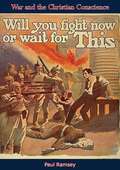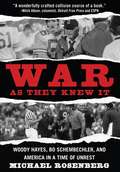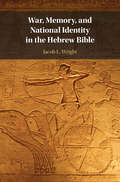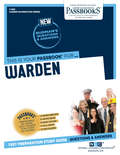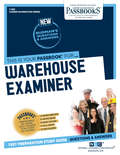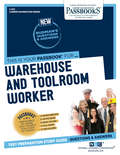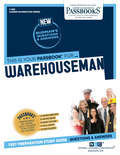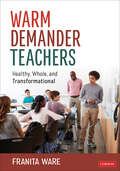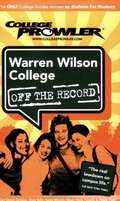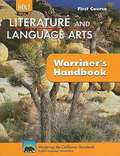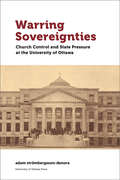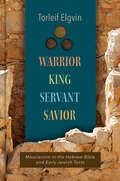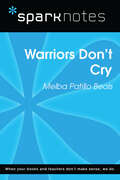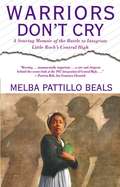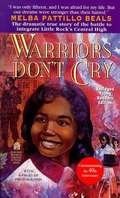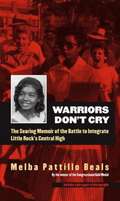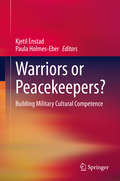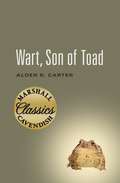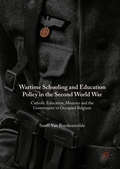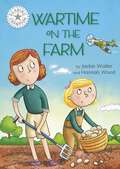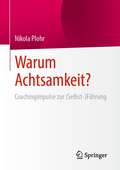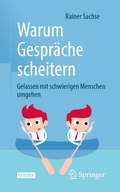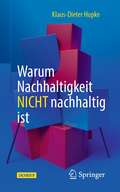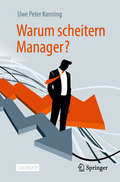- Table View
- List View
War and the Christian Conscience How shall Modern War be Conducted Justly?: How Shall Modern War Be Conducted Justly?
by Paul RamseyA fascinating inquiry into the ancient Christian theory of the "just war" and its application today.“In this volume, a product of the Lilly Endowment Research Program...a competent scholar deals with a major issue in the field of Christian ethics. The central theme of the book is stated in the sub-title, "How shall modern war be conducted justly?" The author seeks primarily to articulate principles of justice relevant to decisions concerning the nature and use of weapons by nations.At this crucial period in international relations Dr. Ramsey thinks that neither unlimited warfare nor the total abolition of force is the desirable solution of the tension. He is convinced that statesmen should give attention to the kind of weapons that should be prohibited in what Dr. Frank Graham has described as an era of "mortal peril and immortal hope."In the quest of a rationale for effective armament, the author sets forth a revised version of the "theory of the just war." After a penetrating analysis of motifs in the doctrine of the just war in the writings of Augustine and Thomas Aquinas and in contemporary Roman Catholic and Protestant thought, he presents norms by which right and wrong action in warfare may be distinguished. He thinks that there is a basic moral difference between limited and total war and that the exposure of noncombatants—including the children, the sick, and the aged—to indiscriminate bombing can not be justified. He is convinced that the possession or the use of megaton weapons surpasses reasonable and moral limitations of international conflict. He believes that justice requires nations to settle disputes by diplomacy, to explore every honorable way to avoid war, and to prepare for a limited and purposeful defense. He argues that "counter-forces warfare" is the only kind of warfare that can be conducted justly and that present weapons of unlimited power should be eliminated at the earliest possible moment.”—Olin T. Binkley
War as They Knew It: Woody Hayes, Bo Schembechler, and America in a Time of Unrest
by Michael Rosenberg[From the front flap] The Vietnam War . . . Nixon . . . Kent State . . . The late 1960s and early 1970s were a time of total turmoil in America-the country was being torn apart by a war most people didn't support, young men were being taken away by the draft, and racial tensions were high. Nowhere was this turmoil more evident than on college campuses, the epicenters of the protest movement. The uncertain times presented a challenge to two of the greatest football coaches of all time. Woody Hayes, the legendary arch-conservative coach of Ohio State, feared for the future of America. His protege and rival, Bo Schembechler of the University of Michigan, didn't want to be bothered by these "distractions." Hayes worshipped General George S. Patton and was friends with President Richard Nixon. Schembechler befriended President Gerald Ford, a former captain and team MVP for the Wolverines. In this enthralling book, Michael Rosenberg dramatically weaves the campus unrest and political upheaval into the story of Hayes and Schembechler.
War, Memory, and National Identity in the Hebrew Bible
by Jacob L. WrightThe Hebrew Bible is permeated with depictions of military conflicts that have profoundly shaped the way many think about war. Why does war occupy so much space in the Bible? In this book, Jacob Wright offers a fresh and fascinating response to this question: War pervades the Bible not because ancient Israel was governed by religious factors (such as 'holy war') or because this people, along with its neighbors in the ancient Near East, was especially bellicose. The reason is rather that the Bible is fundamentally a project of constructing a new national identity for Israel, one that can both transcend deep divisions within the population and withstand military conquest by imperial armies. Drawing on the intriguing interdisciplinary research on war commemoration, Wright shows how biblical authors, like the architects of national identities from more recent times, constructed a new and influential notion of peoplehood in direct relation to memories of war, both real and imagined. This book is also available as Open Access on Cambridge Core.
Warden: Passbooks Study Guide (Career Examination Series #C-2645)
by National Learning CorporationThe Warden Passbook® prepares you for your test by allowing you to take practice exams in the subjects you need to study. It provides hundreds of questions and answers in the areas that will likely be covered on your upcoming exam.
Warehouse Examiner: Passbooks Study Guide (Career Examination Series)
by National Learning CorporationThe Warehouse Examiner Passbook® prepares you for your test by allowing you to take practice exams in the subjects you need to study. It provides hundreds of questions and answers in the areas that will likely be covered on your upcoming exam.
Warehouse and Toolroom Worker: Passbooks Study Guide (Career Examination Series)
by National Learning CorporationThe Warehouse and Toolroom Worker Passbook® prepares you for your test by allowing you to take practice exams in the subjects you need to study. It provides hundreds of questions and answers in the areas that will likely be covered on your upcoming exam, including but not limited to: warehouse equipment, tools and materials; filing practices; safety practices; basic arithmetic; understanding and interpreting written material; and more.
Warehouseman: Passbooks Study Guide (Career Examination Series)
by National Learning CorporationThe Warehouseman Passbook® prepares you for your test by allowing you to take practice exams in the subjects you need to study. It provides hundreds of questions and answers in the areas that will likely be covered on your upcoming exam, including but not limited to: name and number checking; keeping simple inventory records; arithmetic computations; invoice checking; storekeeping and inventory control; and more.
Warm Demander Teachers: Healthy, Whole, and Transformational
by Franita WareFoster a culture of student achievement through authentic relationships and student leadership Expanding her groundbreaking study on Warm Demander pedagogy, Franita Ware offers educators a framework for restoring their ideals about teaching and creating more rewarding and engaging learning experiences. Beginning with a deep dive into Radical Self-Care, the author addresses the harmful effects of stress on teachers and students. Subsequent chapters instruct educators on how to start their journey to become Warm Demander Teachers. Exposing the challenges that educators face, the author encourages them to develop healthy identities for themselves. From there, Ware lays out a path toward collective healing from the harms of an inequitable education system, systemic racism, and intersecting systems of oppression. Engaging and eye opening throughout, Ware provides: Reflection-practice activities in every chapter Guidance for facilitators to support shared learning Real-world examples from Warm Demander Teachers Warm Demander Teachers presents a new perspective and framework for promoting culturally responsive practices: fundamentally, high expectations for students are grounded in trusted, supportive relationships, and instructional strategies highlight culturally responsive inquiry and positive student learner identities. Ware’s insightful delivery provides the necessary support for educators to become healthy, whole, and transformational.
Warm Demander Teachers: Healthy, Whole, and Transformational
by Franita WareFoster a culture of student achievement through authentic relationships and student leadership Expanding her groundbreaking study on Warm Demander pedagogy, Franita Ware offers educators a framework for restoring their ideals about teaching and creating more rewarding and engaging learning experiences. Beginning with a deep dive into Radical Self-Care, the author addresses the harmful effects of stress on teachers and students. Subsequent chapters instruct educators on how to start their journey to become Warm Demander Teachers. Exposing the challenges that educators face, the author encourages them to develop healthy identities for themselves. From there, Ware lays out a path toward collective healing from the harms of an inequitable education system, systemic racism, and intersecting systems of oppression. Engaging and eye opening throughout, Ware provides: Reflection-practice activities in every chapter Guidance for facilitators to support shared learning Real-world examples from Warm Demander Teachers Warm Demander Teachers presents a new perspective and framework for promoting culturally responsive practices: fundamentally, high expectations for students are grounded in trusted, supportive relationships, and instructional strategies highlight culturally responsive inquiry and positive student learner identities. Ware’s insightful delivery provides the necessary support for educators to become healthy, whole, and transformational.
Warren Wilson College (College Prowler)
by Roxy ToddNo university affiliations. No half-truths. No out-of-touch authors who haven't been in school for decades. A class project turned company, College Prowler produces guidebooks that are written by actual college students and cover the things students really want to know. Unlike other guides that jam everything into a five-pound book and devote only two pages to each college, our single-school guidebooks give students only the schools they want and all the information they need. From academics and diversity to nightlife and sports, we let the students tell it how it is. In addition to editorial reviews and grades for 20 different topics, more than 80 percent of each guide is composed of actual student reviews of their school. Whether readers are looking for "Best and Worst" lists, "Did You Knows?" or traditions, College Prowler guides have it all. Our books are the only place for local slang, urban legends, and tips on the best places to find a date, study, or grab a bite to eat.
Warring Sovereignties: Church Control and State Pressure at the University of Ottawa (Regional Studies)
by adam strömbergsson-denoraWarring Sovereignties explores the battle between religious and non-secular cultures for control of the university in the 1960s. Canon law, with particular emphasis on Oblate norms, was a clear expression of Catholic sovereignty in the university. While this sovereignty conditioned Oblate governance choices, the Government of Ontario became increasingly keen on reforming the University of Ottawa into a non-denominational corporation. Government pressure was coupled with shifting cultural expectations of the university’s social role, while an increasingly lay professorate helped put pressure on the Oblates from within. These twin pressures for removing religious control irked the Oblates, who put up stiff resistance, betraying their reticence to the liberalization of higher education. While the government valued social policy, the Oblates focused on educating individuals. Although the Oblates ultimately lost, history is as relevant as ever, and this book comes at a time when social planning is becoming increasingly prevalent within universities. Published in English.
Warrior, King, Servant, Savior: Messianism in the Hebrew Bible and Early Jewish Texts
by Torleif ElgvinAn exegetical and diachronic survey of messianic texts from the Hebrew Bible and Jewish tradition up through the first millennium CE. Jewish messianism can be traced back to the emerging Kingdom of Judah in the tenth century BCE, when it was represented by the Davidic tradition and the promise of a future heir to David&’s throne. From that point, it remained an important facet of Israelite faith, as evidenced by its frequent recurrence in the Hebrew Bible and other early Jewish texts. In preexilic texts, the expectation is for an earthly king—a son of David with certain ethical qualities—whereas from the exile onward there is a transition to a pluriform messianism, often with utopic traits. Warrior, King, Servant, Savior is an exegetical and diachronic study of messianism in these texts that maintains close dialogue with relevant historical research and archaeological insights. Internationally respected biblical scholar Torleif Elgvin recounts the development and impact of messianism, from ancient Israel through the Hasmonean era and the rabbinic period, with rich chapters exploring messianic expectations in the Northern Kingdom, postexilic Judah, and Qumran, among other contexts. For this multifaceted topic—of marked interest to Jews, Christians, and secular historians of religion alike—Elgvin&’s handbook is the essential and definitive guide.
Warriors Don't Cry (SparkNotes Literature Guide Series)
by SparkNotesWarriors Don't Cry (SparkNotes Literature Guide) by Melba Patillo Beals Making the reading experience fun! Created by Harvard students for students everywhere, SparkNotes is a new breed of study guide: smarter, better, faster. Geared to what today's students need to know, SparkNotes provides: *Chapter-by-chapter analysis *Explanations of key themes, motifs, and symbols *A review quiz and essay topicsLively and accessible, these guides are perfect for late-night studying and writing papers
Warriors Don't Cry: A Searing Memoir of the Battle to Integrate Little Rock's Central High
by Melba Pattilllo Beals<P>In 1957, Melba Pattillo turned sixteen. That was also the year she became a warrior on the front lines of a civil rights firestorm. Following the landmark 1954 Supreme Court ruling, Brown v. Board of Education, Melba was one of nine teenagers chosen to integrate Little Rock's Central High School. <P>Throughout her harrowing ordeal, Melba was taunted by her schoolmates and their parents, threatened by a lynch mob's rope, attacked with lighted sticks of dynamite, and injured by acid sprayed in her eyes. But through it all, she acted with dignity and courage, and refused to back down. This is her remarkable story.
Warriors Don't Cry: A Searing Memoir of the Battle to Integrate Little Rock's Central High (Abridged Young Readers Edition)
by Melba Pattillo BealsOriginally published more than a decade ago, this searing account of the 1957 integration of Central High School in Little Rock--an ALA Nonfiction Book of the Year--is written by one of the black teenagers chosen to become warriors on the front lines of the Civil Rights Movement.
Warriors Don't Cry: The Searing Memoir of the Battle to Integrate Little Rock's Central High (Abridged Edition)
by Melba Pattillo BealsAn innocent teenager. An unexpected hero. In 1957, Melba Pattillo turned sixteen. That was also the year she became a warrior on the front lines of a civil rights firestorm. Following the landmark 1954 Supreme Court ruling, Brown v. Board of Education, Melba was one of nine teenagers chosen to integrate Little Rock's Central High School. Throughout her harrowing ordeal, Melba was taunted by her schoolmates and their parents, threatened by a lynch mob's rope, attacked with lighted sticks of dynamite, and injured by acid sprayed in her eyes. But through it all, she acted with dignity and courage, and refused to back down. This is her remarkable story.
Warriors or Peacekeepers?: Building Military Cultural Competence
by Paula Holmes-Eber Kjetil EnstadAs the past two decades of war in Afghanistan, Syria, Iraq, Darfur and the Congo have revealed, war in the twenty-first century looks nothing like the traditional state-to-state conflicts of World Wars I and II which defined the previous century. Resolving today’s conflicts - typically based on complex ethnic, religious, economic and political dynamics - requires far more than mere military strength and technology. The military officer of today must simultaneously be a warrior and diplomat, combatant and humanitarian worker, soldier and peacekeeper. But how can today’s militaries prepare their leaders for such multifaceted roles? Warriors or Peacekeepers seeks to provide answers to this question, comparing and contrasting research on the successes and failures of military cultural education and training programs in seven different countries on three continents (U.S., Canada, Argentina Norway, Denmark, Germany and the Netherlands). This anthology consists of three main sections. The first addresses the theoretical issues of developing the warrior-peacekeeper: what constitutes cultural competence in the officer profession and the pedagogical challenges associated with developing such competence. The second compares teaching practices from various military educational institutions and provides insight into such issues as: how language training can build cultural awareness, helping officers navigate the ethical and moral challenges of dealing with gender in radically different cultures and the best didactic models to develop reflective skills in military leaders. The third section examines the structural and organizational conditions which historically have aided or impeded educational and organizational change in the military. This book will appeal to military academic communities, educational institutions, scholars in security studies, peacekeeping and conflict studies; and to decision-makers in governments and administration.
Wart, Son of Toad
by Alden R. CarterSixteen-year-old Steve's adjustment to high school is made more difficult by the unpopularity of his strict father, a biology teacher known as Toad.
Wartime Schooling and Education Policy in the Second World War
by Sarah Van RuyskensveldeThis book deals with the development of private secondary schooling during the Second World War in Belgium. It focuses on how the German occupier used education to gain acceptance of the regime, and discusses the attitudes of Belgian education authorities, schools, teachers and pupils towards the German occupation. Suggesting that the occupation forced Belgian education authorities, such as the Roman Catholic Church, to take certain positions, the book explores the wartime experiences and memories of pupils and teachers. It explains that the German Culture Department was relatively weak in establishing total control over education and that Catholic schools were able to maintain their education project during the war. However, the book also reveals that, in some cases, the German occupation did not need total control over education in order to find support for some authoritarian ideas. As such, Van Ruyskenvelde's analysis presents a nuanced view of the image of the Catholic Church, schools, teachers and pupils as mere victims of war.
Wartime on the Farm: Independent Reading White 10 (Reading Champion #517)
by Jackie WalterThis story is part of Reading Champion, a series carefully linked to book bands to encourage independent reading skills, developed with Dr Sue Bodman and Glen Franklin of UCL Institute of Education (IOE) Fantastic, original stories are accompanied by engaging artwork and a reading activity. Each book has been carefully graded so that it can be matched to a child's reading ability, encouraging reading for pleasure. Perfect for 7-9-year-olds or those reading book band white.In the middle of the bombing of London in World Two, Ivy and Kitty are sent to live on a farm in Cornwall to keep them safe. How will the sisters settle into their new life?
Warum Achtsamkeit?: Coachingimpulse zur (Selbst-)Führung
by Nikola PlohrDas Buch folgt dem Anliegen, einen Dialog zu eröffnen und zum Nachdenken und Reflektieren anzuregen. Der Prozess, durch den das Buch die Leser*Innen leitet ist für alle geeignet, die sich mehr mit sich selbst und ihren inneren Mustern beschäftigen möchten und auch offen sind für neue Anregungen im Umgang mit anderen. Der Text führt von innen nach außen, aus der Theorie in die Praxis und aus der Reflexion ins Tun. Der erste Teil, Inner Leadership, widmet sich den vielschichtigen Möglichkeiten zur Selbstreflexion, die für das zeitgenössische Verständnis von Führung unabdinglich ist. Achtsamkeit hält als Praxis und Begriff den Raum für die Hinwendung zum Innenleben, den inneren Geschichtenerzähler*Innen, dem individuellen Umgang mit Kritik, Emotionen und dem allgegenwärtigen Streben nach Anerkennung. Im zweiten Teil wird die teambasierte Führungspraxis in den Fokus gerückt. Unter dem Schlagwort Mindful Leadership werden einige der vielen zwischenmenschlichen Ebenen und Verbindungen beleuchtet, die nicht nur das Arbeitsleben prägen. Darunter: Kommunikation, Inspiration, Mut, Entscheidungen, sowie Zugehörigkeit und Nachhaltigkeit. Jedes Kapitel endet mit Reflexionsfragen und Übungen, die aus der Theorie in die Praxis überleiten.
Warum Gespräche scheitern: Gelassen mit schwierigen Menschen umgehen
by Rainer SachseDieser Ratgeber hilft Ihnen, wenn Sie im Alltag regelmäßig schwierigen Interaktionssituationen ausgesetzt sind. Beispiel: Interaktionspartner kritisieren, werten ab, reagieren ärgerlich aus scheinbar nichtigen Anlässen, geben Anweisungen, ohne dazu berechtigt zu sein, manipulieren usw. Solche Handlungen gehen meist von Personen aus, die sogenannte Persönlichkeitsstile oder Persönlichkeitsstörungen aufweisen. Sie empfinden das als stressig, unangenehm, belastend oder ärgerlich und es ist meist schwierig, konstruktiv damit umzugehen? Dann sind Sie in bester Gesellschaft. Das Buch soll verständlich machen, warum Personen solche Handlungen ausführen, was sie damit wollen und wie Sie konstruktiv damit umgehen können. Geeignet für Partnerschaft, Familie, bei der Arbeit mit Kollegen und Chefs oder auch bei Menschen, mit denen man nur wenig (aber schwierigen) Kontakt hat. Hilfreiche Strategien aus dem Inhalt: Gelassen bleiben, entspannt bleiben – nicht aggressiv reagieren – nicht mit gleicher Strategie aufwarten – nicht defensiv reagieren – souverän bleiben. Über den Autor: Prof. Dr. Rainer Sachse macht komplexe psychologische Sachverhalte allgemein verständlich und stellt sie humorvoll und einfühlsam dar. Das ist für Laien ebenso mit Gewinn lesbar wie für Fachkolleginnen und -kollegen.
Warum Nachhaltigkeit nicht nachhaltig ist
by Klaus-Dieter HupkeWir alle sollen nachhaltig werden. So ist es jedenfalls generell in Wissenschaft, Medien und Politik zu hören. Doch: „Nachhaltigkeit“ – Was ist das überhaupt? Und wie gut stehen die Chancen, Nachhaltigkeitskonzepte auch durchzusetzen?Dieses Buch versucht überhaupt nicht erst, den vielen „Nachhaltigkeitsbüchern“ noch ein weiteres hinzuzusetzen. Es stellt vielmehr die gesellschaftliche Grundlage für „Nachhaltigkeit“ ganz grundlegend in Frage. Und es zeigt, dass wir uns, gerade wenn wir Nachhaltigkeit anstreben, sehr schnell in Widersprüche verwickeln. Und regelmäßig erreichen wir damit nicht die „Nachhaltigkeit“, sondern das pure Gegenteil.Wasser sparen bei der WC-Spülung? Nur noch zertifizierten Kaffee trinken? Fernflüge nur noch gegen eine Klima-Abgabe? - Der Autor dekonstruiert einen Nachhaltigkeitsanspruch nach dem anderen.Ein Pamphlet gegen Klimaschutz, gegen Bewahrung der Biodiversität oder gegen die wirtschaftliche Entwicklung ärmerer Länder ist dieses Buch dennoch nicht. Es versucht aber dagegen die Grenzen eines umfassenden Nachhaltigkeitsansatzes aufzuzeigen.
Warum scheitern Manager?
by Uwe Peter KanningManagementfehler haben mitunter weitreichende Konsequenzen für viele Menschen, die davon unmittelbar oder indirekt betroffen sind. Fast jeder kennt Fälle in seinem Umfeld oder glaubt Betroffener von Managementfehlern zu sein. Wenn Sie wissen möchten, wie Managementfehler entstehen und wodurch sie sich ein Stück weit eindämmen lassen, ist dieses Buch genau richtig für Sie, denn hier werden beispielsweise die folgenden Fragen beantwortet: Wie wird man (Spitzen-)Manager*in?An welchen Eigenschaften scheitern Manager*innen? Warum treffen Manager*innen Fehlentscheidungen?Wie täuschen Manager*innen sich und andere?Warum werden sie nicht frühzeitig gestoppt? Anhand von interessanten Informationen und Stories erhalten Sie einen Einblick in konkrete und bekannte Fälle von Missmanagement. Aufgrund der augenöffnenden Analyse, die auf psychologischen Erkenntnissen basiert, können Sie wertvolle Schlussfolgerungen ziehen. Zielgruppen: Berufstätige und alle, die sich ein gutes Management wünschen, sowie diejenigen, die Führungskräfte, Manager und Managerinnen, einstellen, sie führen oder mit ihnen zusammenarbeiten. Zum Autor: Prof. Dr. phil. habil. Uwe Peter Kanning ist Professor für Wirtschaftspsychologie an der Hochschule Osnabrück. Er ist Autor zahlreicher Bücher. Seine Arbeit wurde vielfach ausgezeichnet, u.a. 2016 „Professor des Jahres“ (UnicumBeruf) oder 2019 Wahl unter die „40 führenden Köpfe des Personalwesens“ (Personalmagazin). Seit 1997 berät er Unternehmen und Behörden bei wirtschaftspsychologischen Fragestellungen.
